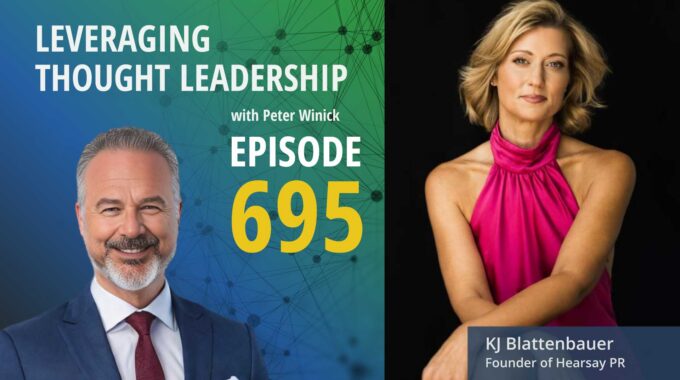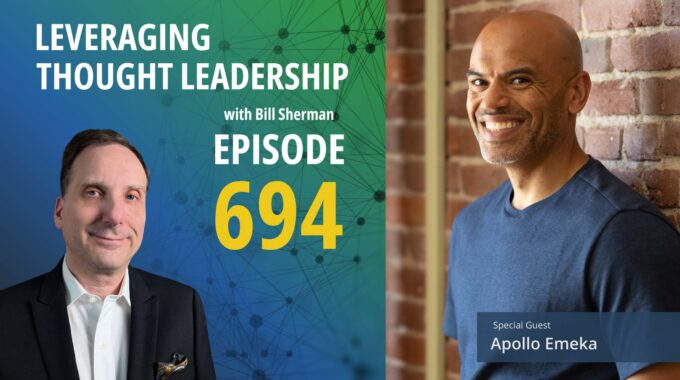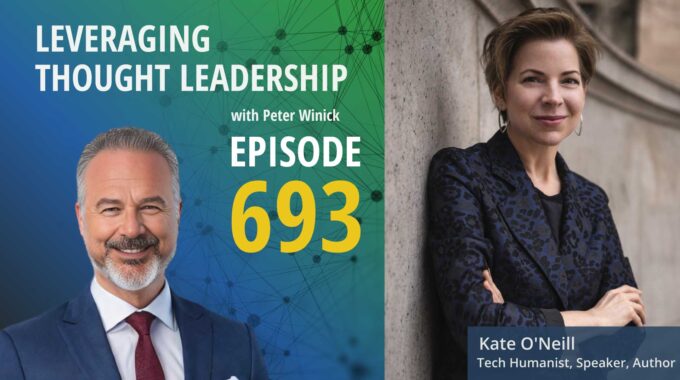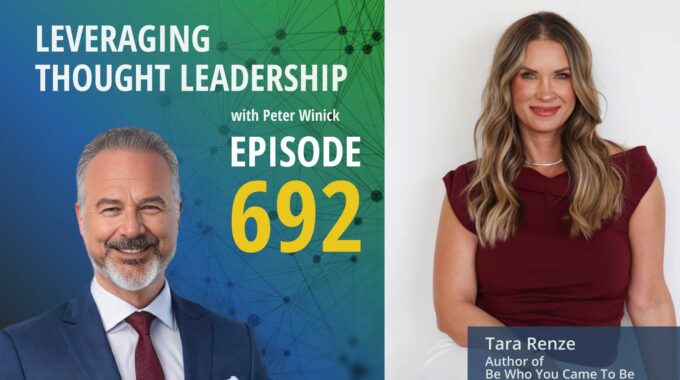Why Authority Compounds When You Show Up How PR turns expertise into authority: consistent visibility,…
Sustainable Business and the Power of Thought Leadership | Christopher Marquis
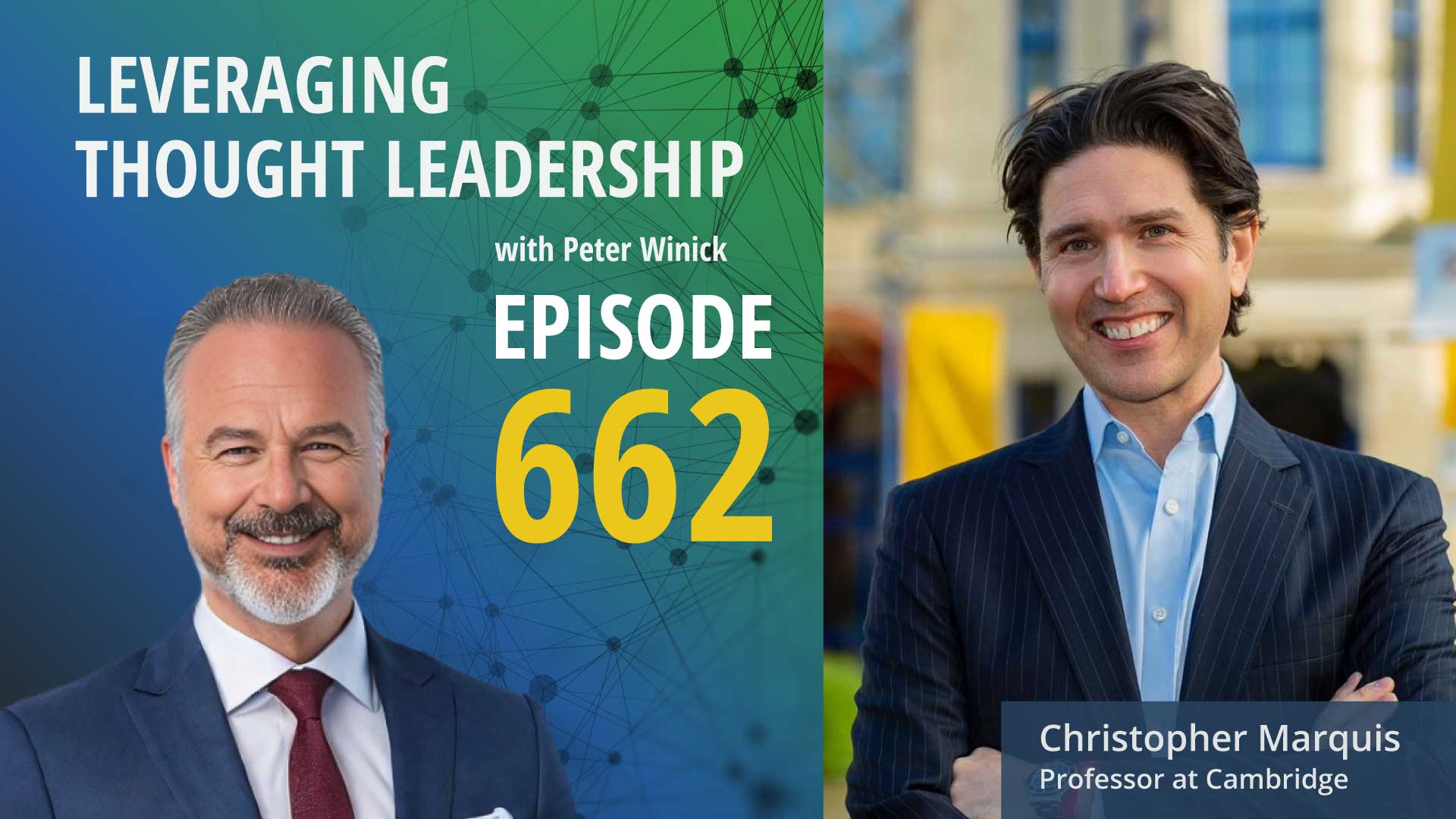
Bridging research and real-world impact in sustainability and business
This episode explores how to break ideas out of the academic bubble and make them matter in the business world. It covers strategies for translating complex research into clear, actionable insights, choosing which ideas deserve a book, and balancing timeless principles with timely examples. You’ll hear how op-eds, articles, and storytelling can amplify reach, and how sustainability can be framed as both a moral imperative and a strategic advantage.
What happens when world-class research escapes the ivory tower and takes root in the boardroom?
In this episode of Leveraging Thought Leadership, Peter Winick sits down with Christopher Marquis — Professor of Chinese Management at the University of Cambridge and author of “Profiteers: How Business Privatizes Profits and Socializes Costs”
Chris is on a mission to bridge the gap between scholarship and the real world. He believes that ideas shouldn’t be trapped in academic journals read by only a handful of peers. Instead, they should spark change in boardrooms, inspire sustainable business practices, and help leaders tackle global challenges like climate change. His work blends rigorous research with compelling storytelling, translating complex theories into actionable strategies that resonate with executives, policymakers, and entrepreneurs alike. — to explore the art of turning academic insight into practical, high-impact business thinking.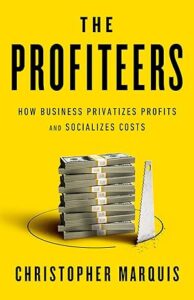
From op-eds in The Washington Post to features in Harvard Business Review, Chris knows how to make ideas travel. He shares how brevity, boldness, and a clear thesis can elevate a message — and why writing 800 words for a newspaper can sometimes have more impact than publishing in the most prestigious academic journal. For Chris, thought leadership is about reach and relevance, not just citations and tenure points.
The conversation dives into the discipline of choosing which ideas deserve a book, the craft of finding evergreen principles that survive political and economic cycles, and the skill of meeting business leaders where they are — without losing academic rigor. Chris also offers practical advice for academics ready to step beyond their university walls, connect with executive audiences, and position their work at the intersection of insight and impact.
If you want to understand how to turn deep expertise into broad influence — without watering it down — this episode will show you how.
Three Key Takeaways
Academic credibility needs business reach — Groundbreaking research has little impact if it stays locked in academic journals. Translating ideas into accessible formats like op-eds, HBR articles, and books makes them actionable for business leaders.
Evergreen principles drive lasting influence — Successful thought leadership balances timeless core ideas (like sustainability imperatives) with timely examples that connect to current cultural, political, or economic contexts.
Storytelling bridges the gap — Data and theory matter, but real-world stories, case studies, and clear narratives are what resonate with executive audiences and create lasting engagement.
If you enjoyed Christopher’s episode, don’t miss our conversation with Mark Smith, who built SHRM’s thought leadership function from the ground up. Both share a passion for taking complex research and turning it into clear, actionable insights that reach the right audiences. Chris brings the global lens of sustainability; Mark offers the inside view of embedding thought leadership within an organization. Together, these episodes show you how to move ideas from theory to real-world influence.
Listen here: Discovering Thought Leadership – Mark Smith
Transcript
Peter Winick And welcome, welcome, this is Peter Winick, I’m the founder and CEO at Thought Leadership Leverage, and you’re joining us on the podcast today, which is Leveraging Thought Leadership. Today my guest is Chris Marquis, he’s the Sinyu Professor of Chinese Management at the University of Cambridge, and is the author of Profiteers, How Business Privatizes Profits and Socializes Costs. He’s written several other books in the B Corp space and sort of conscious capitalism, and he’s passionate about how academic research can help people around the world address. Some of the biggest crisis is of our day and then he did have a stint in financial services most recently at as a VP at JP Morgan. So welcome aboard Chris.
Christopher Marquis Thanks so much, Peter. Great to be with you.
Peter Winick So how did this happen? Not the academic path, because that’s typically fairly logical and predictable and linear, but this whole thought leadership, authorship stuff, if you will.
Christopher Marquis Yeah, good question. So many academics, and I think it’s such a missed opportunity, are very happy to write papers, sit in their office with a database on their computer, and turn out statistics and regressions. But I think actually my earliest experience as a faculty member, I was at Harvard Business School. All the places that really values actually engaging with practice, taking ideas. You know, or from research and actually work with managers, leaders to really make, to make them work. And then, you know it’s a reciprocal process. I mean, I mean I’m sure that I’ve learned so much more from the companies that I have talked to, the students have had, then you know they’ve learned from me.
Peter Winick Yeah, so it’s interesting because when you think about what does it take to be a successful academic, it’s largely exactly what you talked about, the publishing, the research and all those things, but the reach is not a KPI, if you will, right? So I find it’s sad almost that the amount of energy and effort and blood, sweat and tears that an academic puts in to a paper to make sure it’s polished to the 11th decimal. And the reality is, you know, seven people read it, or you go to this one obscure conference every year and you debate it with your arch rival, the other academic at another place. And the academics that sort of move from traditional academia to, it’s called mainstream business lexicon usage language, not all of them are comfortable there. Now you had a stint in the quote, real world.
Christopher Marquis Yeah. So, so that, I think gave me a little bit of a leg up on this because actually I had worked in large corporation, you know, growing up, my grandparents, parents were sort of in business. So I did have a good sort of feel for, you know, actually engaging with business audiences. But many, as you mentioned, academics, you know, they go through just their PhD right after their undergraduate had never worked. And like you said, I mean, it’s, you know, the, the one sort of KPI that is sort of audience oriented as citations, but those citations are in other academic journals. And so it ends up being a very insular type of system. So I had always sort of been thinking about how I can actually take my work and get a broader audience, broader impact. And there’s this amazing tenure institution in academics. And so really after that, I’ve been working very hard to sort of try to break out the academic street jacket and it’s, it’s tough because you know, the institutions, you know I don’t think the organization I was at the time Cornell was particularly interested in having me do that. The reason being that a lot of the rankings for MBA programs actually relate to those very specialist narrow journals that people publish in. So I’m actually someone who is relatively good at publishing in these academic journals, and so they wanted me to. You know, keep that crank spinning. But I’m really happy with the research work I did and I continue to publish in academic outlets. But it seemed to me if that was all I did in my life, it would not be a very fulfilling life and probably I’d burn out. So I really feel very fortunate that I’ve been able to sort of write some books and articles in places like HBR, lots of, you know. The thing that I really tried to focus on is general interest op-eds. So, you know, Washington Post, Guardian, Financial Times.
Peter Winick Where an idea gets put out matters, right? So in academic journals, we discussed limited reach, but highly accurate or relevant or researched or whatever we want to use there. Then you go to sort of, you know, well, I can throw something up on LinkedIn. Yeah, but you know so can anybody, right. But then you think about an op-ed and it’s interesting because the world of op-eds has changed and continues to change. And what’s cool about an op-ed, A, it’s short, right? Thousand words, 2000 words in motion.
Christopher Marquis 800 words usually a lot yeah financial times once it even lower like 700 words yeah
Peter Winick So it’s short, you got to get to the point and that audience is really, really targeted, right? So if you say to me, right, I’m going to write an op ed piece for New York Times, Washington Post, whatever, whatever you kind of know what an audience is there. And I would argue that if I were to compare your best academic paper to your best op ed pay paper, it’s probably hard to realize if somebody changed the names that it’s really both you.
Christopher Marquis Exactly, exactly. No, I think that’s, um, that’s exactly right. Because it’s something, you know, there’s, like I mentioned a variety of sort of institutional systems around rankings and what’s actually valued in universities that’s important, but also, you know, as I’ve been trained training and written myself for 15 years in a very academic style that is, you’re always. Like need to be very careful and hesitant. Whereas in op-ed, you obviously want to be accurate, but you should be bold and make a statement and a thesis. And so it’s taken me many, many years to actually, in many, many rejections, many, many things I’ve written and sort of sitting on my computer, taking up hard drive space and nothing has happened to them. But yeah, it’s been a good learning experience. No, you’ve written three books, four books? I’ve written 3 books.
Peter Winick Yep. Three books. So tell me about your process of deciding what ideas are worthy of that. So to me, and it’ll be somewhat snarky piece. There are sometimes a Ted talk and you’re like, I want to know more. That needs to be a book. And there’s some, there are books that you read and said, it would have been okay if that stayed an 18 minute Ted talk, like we needed to kill 45,000 words, which what could have been. Far less than that. How do you make those determinations? What I’m going to write about and why, and how, and
Christopher Marquis Yeah, I mean, I it’s, it’s a good question because I’m actually, I’m trying to think through what my next book is going to be, and I’m really struggling because you know, the world has changed a lot in the last, you know, sort of year, number of months to year and a lot of things I’m focused on are sustainability, climate change. And so, you know how to actually write a book that is, like you mentioned, you, know, well, there’s enough there for 200 to 300 pages. Yeah. I’ll find it relevant. But also it sort of meets the moment where it, you know, it fits into the broader cultural conversation right now and it’s a very complex cultural conversation to fit into, so.
Peter Winick If you’re enjoying this episode of Leveraging Thought Leadership, please make sure to subscribe. If you’d like to help spread the word about our podcast, please leave a five-star review at ratethispodcast.com/LTL and share it with your friends. We’re available on Apple Podcasts and on all major listening apps, as well as at thoughtleadershipleverage.com/podcast.
Peter Winick Stay there a minute because the world, according to me, probably not necessarily accurate, but I want to get your take on this. One of the ways that I look at anybody’s thought leadership, which is what I do all day is, okay, what are the components of that? The elements of this that are going to be true, regardless of who’s in the White House, are we in a recession? Is the stock market up fight? Like these truths are true, right? So gravity doesn’t care. You throw the rock off the building, gravity is going to show you what’s why. What’s evergreen versus what is more or sometimes less on point today, this moment in time, whatever, based on political factors, macroeconomic factors, cultural whims, whatever. How do you think about that? Or do you?
Christopher Marquis Yeah, I think that’s, I really like the way you put that because, you know, I have sort of a real mission, a passion around business sustainability. Yes. I believe it’s sort of an imperative for our world. It’s an imperative, for businesses, it’s imperative for my students and individuals. So this is something that is maybe that core, but you know you have to think about how to, you know, maybe what cases. And examples I use to frame and flesh that out, how to actually communicate that message in a way that, you know, it resonates with broader audiences. And so, you now, I think the core is there, but really trying to find the right way to mess it, to craft the message and craft cases and examples, select the cases and the examples. Cause I, you, I write a number of times a month on Forbes about, about new. Search sustainable companies have discovered. I’ve probably done over three to 400 of those over the past number of years. So I, I have a huge number of examples in cases and contexts that I’ve studied over these years and like, which, I don’t know, 10 of those, you know, are the, are, are right ones to actually, you know, put forward.
Peter Winick Wait there a minute. So I would argue, or my experience has taught me that thought leaders, particularly academics, have no shortage of the next 20 things I’m going to think about, write about, do whatever. They’re typically not good at being efficient. And I define that by saying, wow, if you’ve got this library of, would you say 300 Forbes articles? Yeah. Yeah. Easily. If I were to say to you, we could put a moratorium on you, you probably wouldn’t like this. You’re going to feel shackled. We’re going put a more term on you writing any more for the next year. But yeah, you’re already cringing. I guess, but I would argue that once a week, or we pick a cadence three times a month, something we’re going to pull stuff from the archives and maybe give it a little nip, tuck, dust it off and change a context in order to make the point. I would argue that that’s probably efficient. Now I see the cringe factor on you, but then feel free to put back.
Christopher Marquis So I, I treat it very much like in some ways, a business scan that I, that I’m doing to sort of get it to sort stay up to date, you know, what I do actually for these, and it’s not a huge time investment. I do an interview, something like we’re doing here, easy transcription, you know, things can be transcribed very easily now automated way. And I write a two, three paragraph intro. And so this is helping me build and keep connections. And also keep on top of like the new, you know, what’s new. And so I do, I have a newsletter where actually I try to do what you’re saying. I actually go back and find maybe a topic. So for instance, is this, I’m just working on the ones coming out this Saturday, you know it’s going to be on sustainable vineyards. And I’ve done a few of these articles on sustainable vignettes. I then have a Google alert that I set and it takes a bunch of. Sustainable vineyards content. I sort of roll that all together to sort of make a bigger, a bigger point. So, so I agree with you that I need to be thinking much people should be thinking, much bigger picture, not just continue to do these cases. So I think that’s a fair.
Peter Winick Yeah. And I think it’s the, you know, sort of the cursory creative is we want to create stuff, which is in conflict with the curse of the CEO, which is what is the most efficient way to get from A to B. And, and I like the way you’re bridging both of those. Cause you’re never going to stop the create. Like the day you stop that, like you’re in trouble or other reasons. And you, then it’s just, you can hire an efficiency expert to say, dude, play the role of me for the next two years. I’m going to go play golf or something. What would you say to and academic or academics that are out there now listening, because there’s a bunch, that are thinking about how to cross over, right? So they’re rock solid academics, which is not an easy task in and of itself, the whole tenure track and all the way, the publishing and all of the things. But they’re thinking, hey, I wanna go to the other side. You know, I want to, not in a binary way, but like, how do I stay relevant to the business community and meet them where they are, while still maintaining the integrity and the validity of-of- the academic pursuits.
Christopher Marquis Yeah. I mean, it depends, I guess, you know, in some ways how much they’ve done to this already, but I think it’s someone that’s rather that maybe, you know, has graduated seven to 10 years ago, recently got tenure. You know, I would think that actually thinking very thoughtfully to start about their classes and their executive education, most large business schools have executive education. I mean so much of what I’ve learned actually is from, you know, the M you know business students or MBAs. I just went to dinner with a bunch who are interested in sustainability here at Cambridge. And we were going around sort of introducing ourselves. And most of them had seven or eight years of experience in really interesting organizations. And so I think that actually start thinking about which of your material is resonating better with your students, the exec ed audiences than not. How can you begin thinking about those ideas in maybe a bit broader way. You know, a lot of times academic articles, you know, or use like databases and have a lot theory on them. And really you need stories and narrative. And so through your students, you know see what stories they have, you now, exec ed, what stories do they have that actually resonate in the press. You know I use my teaching a lot. You know there’s all kinds of things that are happening on a day to day basis. Wall Street Journal, Financial Times, It’s New York time. You know, that sort of bring the points to life. I mean, I think that is the challenge because, you know, writing academic papers, it’s about identifying what the gap is that has not been done before that you’re filling.
Peter Winick And what are you adding to the conversation? Right. What’s your perspective? What’s you’re take? And then, and then show your work, right? Of course. Yeah. You have to be rigorous. If you’re going to Forbes or something like that, you could just pontificate, right. You go into HBR, there’s a different level, academia, different levels.
Christopher Marquis Yeah, exactly. So, and I think trying to really get, you know, the story sort of down, what are the sort of key case studies, examples that can really illustrate the research points, the unique research points because every academic, you now, has their key findings and papers that actually, and then, you, know, places. Similar to HBR, like Stanford Social Innovation Review, California Management Review, MIT Sloan Management Review. Those, I think, are good places to maybe start. I mean, HBR is really tough to get into. I mean. Yeah. So, and try writing some things, you know, to get out there. Maybe think about a book as well. Upeds, I found they’re better after I’ve done a book.
Peter Winick Because build on that. Yeah.
Christopher Marquis Exactly. And then you, yeah. So you’re sort of, you build it up and then sort of boil it, boil stuff down for the, you know, for the op-ed.
Peter Winick Well, an op-ed is a good bridge to say, I wrote the book on X, now I’m gonna give you a short taste of that on Y. Exactly. At least on Z that’s going on in the universe and the world today, great. This has been great. I really appreciate your insight, Chris, and sharing your experience. Thank you. Thank you so much for spending the time with me today.
Christopher Marquis Yeah, I really enjoyed it, Peter. Thank you.
Peter Winick To learn more about Thought Leadership Leverage, please visit our website at thoughtleadershipleverage.com. To reach me directly, feel free to email me at peter at thoughtleadershipleverage.com, and please subscribe to Leveraging Thought Leadership on iTunes or your favorite podcast app to get your weekly episode automatically.


